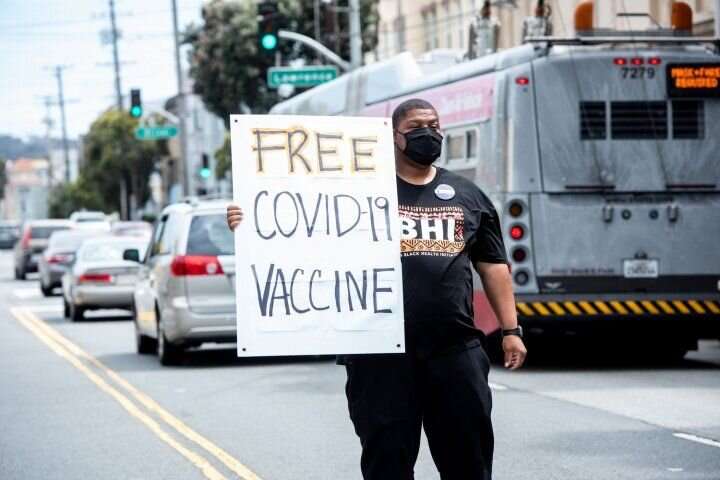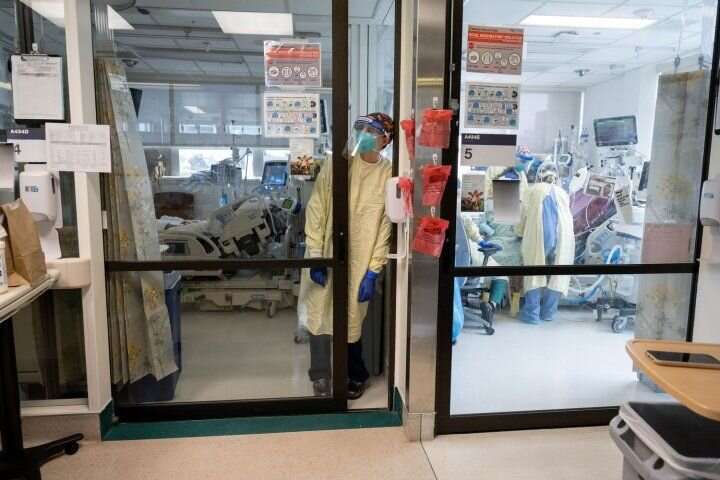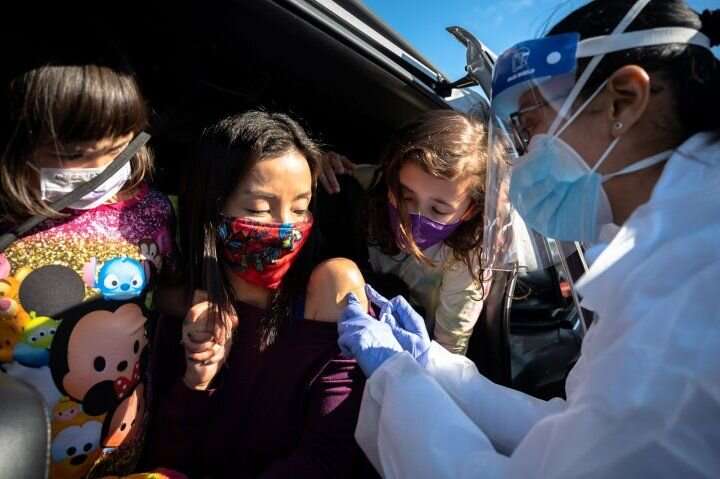How dangerous is the Delta variant? Heres what the science says

Breakthrough infections. Increased transmission. New mask recommendations and mandates. The Delta variant is fueling COVID-19 cases across the U.S., and raising questions about what this all means for the course of the pandemic.
The highly infectious Delta variant was first detected in India in March, and it now accounts for more than 93 percent of sequenced coronavirus cases nationwide.
Last week, the Centers for Disease Control and Prevention recommended that fully vaccinated people in areas of high transmission return to masking in public indoor spaces, citing evidence that the Delta variant can produce high viral loads in the noses and throats of even the fully vaccinated.
While experts agree that the vaccines still offer strong protection against infection by the Delta variant, and especially against severe illness and death, questions remain. We are only beginning to understand how the new variant spreads so efficiently, whether it causes more serious illness, and why there are more breakthrough infections as Delta spreads.
We spoke to virologist Nadia Roan, Ph.D., associate professor at UC San Francisco and associate investigator at the Gladstone Institutes, about the latest developments in our knowledge of the Delta variant.
How much more infectious is the Delta variant? How is it able to do that?
According to an internal CDC document, the Delta variant—one of four “variants of concern” that have evolved from SARS-CoV-2, the virus that causes COVID-19—is more than twice as infectious as the original virus and as infectious as chickenpox.
Its high infectiousness could be due to its ability to replicate rapidly in the body. A study from China reported that people infected with the Delta variant can carry 1,000 times the viral load as those infected with the original virus. “To me, that’s shocking,” said Roan. That study also found that people infected with the Delta variant carry detectable virus earlier than with the original virus (four days versus six days after exposure) and another study found that they remain infectious longer (18 days versus 13 days).
“Not only is it replicating more, it’s replicating faster, and that’s probably why it’s able to spread so much more efficiently,” said Roan.
That efficiency comes down to the molecular details. We know that the Delta variant carries multiple mutations, including within the spike protein which it uses to latch onto and enter cells. Of particular note, said Roan, is a spike protein mutation at what’s known as the furin cleavage site. This site is important for “priming” or activating newly replicated viruses to begin infecting cells. Unpublished studies suggest that the original virus primes about 50 percent of its viruses, whereas the Delta variant primes more than 75 percent.
“That might potentially explain why it’s able to transmit much more efficiently and why the viral loads are so much higher, although other mutations that Delta accumulated could very well contribute also,” said Roan.

Does the Delta variant cause more serious disease?
There’s not yet consensus on whether the Delta variant makes people sicker. The internal CDC document cited studies from Canada and Singapore (not yet peer-reviewed) that found higher odds of hospitalization and death, and a study from Scotland that found double the risk of hospitalization compared to the Alpha variant, which had been the dominant variant in the U.S. before Delta’s rise.
This is concerning as the Alpha variant was already demonstrated to cause more severe COVID-19 than the original virus, said Roan.
What are breakthrough infections and are they more common with the Delta variant?
A breakthrough infection is an infection in a fully vaccinated person. They can occur if the body fails to mount a strong enough immune response to prevent an infection.
Overall, all the vaccines remain highly effective at preventing severe illness and death from the Delta variant. For example, various studies have reported the Pfizer vaccine to be 93 to 100 percent effective against hospitalization and death, with somewhat lower effectiveness, 64 to 88 percent, against all symptomatic disease.
A recent analysis of breakthrough cases among UCSF employees and staff since Delta’s rise showed that unvaccinated people remain five times more likely to become infected than people who are vaccinated, and 25 times more likely to be hospitalized.
While it’s not entirely clear why there are more breakthrough infections with the Delta variant, “I would guess the high viral load is a big part of the equation,” said Roan.
“When you’re essentially just exposed to so much more virus, there’s a higher chance that you can get infected, whether you’re vaccinated or not,” she said. “Of course, vaccination is one of the best barriers, but it’s not a 100 percent barrier against getting infected.”
Though still uncommon, breakthrough infections with the Delta variant may impact public health. In an analysis of a recent outbreak in Provincetown, MA, that caused over 450 infections in the state, the CDC reported that the viral load was indistinguishable between breakthrough infections and cases in unvaccinated individuals.
“This was of course what sparked the CDC’s recommendation that everyone, including vaccinated people, mask up indoors, since the data would suggest that breakthrough infections can potentially transmit the virus,” said Roan.
Do the breakthrough infections mean the Delta variant is better at evading the vaccines? How does it do that?
Compared to the original virus, all the variants thus far are somewhat better at evading the immune system’s antibody response, some better than others, said Roan. That’s because so-called neutralizing antibodies recognize and bind to the spike proteins on the surface of the virus, preventing the virus from infecting cells. But if the virus mutates its spike protein, then the antibodies may not bind as well, and the virus gains an advantage.

Fortunately, the antibody response is only part of the story, said Roan, whose lab studies another part of our immune response known as the T cell response. She and others have found evidence that our T cell response is less affected by variants.
“T cells work differently,” she explains. T cells don’t target the virus directly, but instead recognize infected cells and destroy them, stopping the virus from replicating inside them. The recognition can also activate “helper” T cells which aid the responses of other immune cells. An infected cell signals to a T cell by presenting little pieces of viral protein on its surface.
“The reason the T cells are more resistant to the mutational effect is because each person generally presents a different little piece of the virus to their T cells,” said Roan. So a mutation would for the most part only affect someone whose cells present that particular piece of the virus. “When the virus is transmitted to another person, that mutational advantage is lost, unlike the antibody case where neutralizing antibodies from different individuals often target the same locations in the spike protein.”
“In other words, when the virus mutates, the antibodies are less able to do what they’re supposed to do, but T cells are more resistant to the mutation effects,” said Roan.
How important is our T cell response to fighting the Delta variant?
Roan’s lab is currently preparing to study the Delta variant, and she is optimistic that the T cell response will hold up. They have already shown that the T cell response is just as strong against the Alpha, Beta, and Gamma variants as it is against the original virus.
Roan’s team has also found that T cells may be particularly important in preventing severe COVID-19 infections. In a study of patients who were in the ICU for COVID-19, those who recovered showed a massive increase in T cell response right before they were discharged from the hospital, while those who died never developed a robust T cell response.
“T cells are probably less important for preventing that initial infection—that’s where the neutralizing antibodies come in,” said Roan. “But then the T cells play an important role in making sure a person who has already been infected recovers.”
What does the Delta variant mean for people who are unvaccinated? For people who are fully vaccinated?
For the unvaccinated, the Delta variant presents a serious threat, and now more than ever it is crucial to get vaccinated. “It’s definitely going to be a lot riskier,” said Roan. “Right now, as many folks have said, this is a pandemic of the unvaccinated in this country.” More than 97 percent of those currently hospitalized with severe COVID-19 are unvaccinated.
The faster we can get more people vaccinated, the faster we can recover from the current surges, minimize deaths, and avoid straining the medical system, said Roan.
While breakthrough infections are more of a concern with the Delta variant, those infections are generally mild or asymptomatic. “The good news is that the vaccines were designed to protect against severe COVID, and they’re still doing their job,” said Roan.
Source: Read Full Article



